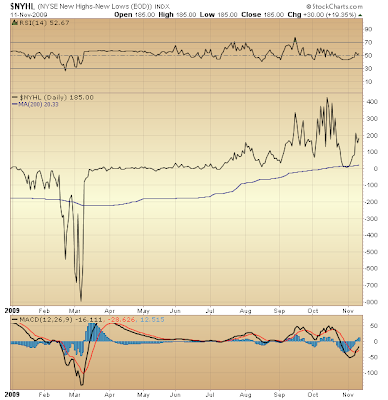My how the pump is running full bore in fantasy claiming the recent pickup in merger activity among publicly traded companies is a sign of a return to normalcy. Yet any thoughtful observer will find plenty of reason dissipating the dreamy fog filling the financial media and conclude current conditions effectively are so far from normal as to be alien.
We've all heard corporations are flush with cash, yet no one seems willing to face reality. No one asks where the greater preponderance of this cash is coming from. Little wonder when the entire media edifice was created for times like these, when the buyer of last resort has been reduced to souls whose sense of financial history is as dull as Ben Bernanke. To wit: with 70% of companies recently reporting their Q3 '09 earnings still showing declining revenues there is 99.9% certainty most free capital is not being generated from day-to-day operations. Rather it is originating via bond sales.
Bonds represent a financial liability higher up on the accounting food chain than equity. Unlike equity, however, this debt must be repaid in a timely manner. Yet should revenues from day-to-day operations continue languishing, then what? Well, depending on capacity to continue raising capital in the bond market and paper over the problem, in all probability it will be buh-bye equity.
Corporations, much like consumers over the past thirty years, quite simply are being led into a debt trap. And if this were not bad enough, history has shown that, most corporate mergers wind up dismal failures, business-wise, in and of themselves. Likewise, that mergers generally do not occur without disruptions in day-to-day operations should be all the more disturbing when the financial situation for most corporations, although momentarily stabilized, is as tenuous as it has ever been. Companies must perform, and stat, or surely they will die.
You see, this is not 1982. Nor is it 1991 or 1995. Unlike days of old, today, generally speaking, corporate America finds itself leveraged to the teeth. Not only that, but thirty years spent stripping productive capacity to the bone has left about as much wiggle room as exists in a tin of sardines. So, cash on the balance sheet might look pretty standing alone, naked, but dressed up in debt presently being added upon businesses badly positioned in the scramble for the crumbs being made available to stimulate economic activity, and the picture becomes much, much less attractive. Just for the record, $800 billion, were this actually being spent, still would amount to a pittance in the grand scheme of a multi-decade deficit in economic infrastructure investment. We are, in fact, short to the tune of trillions of dollars needing to be spent annually from now until the cows come home. Anything short of this is but skimp bait — crumbs — laid in a trap.
Add to this problematic issues surrounding the globalization of finance. The chain of dependencies is, as always, no stronger than its weakest link. Were any one of these to break interest rates could shoot through the roof in an instant. China, less so, and Great Britain, more likely, presently are among the weakest links in the Treasury bond market. Should a wave of selling hit U.S. Treasuries — either out of necessity or political intrigue — the impact on credit markets will be devastating. And where would this leave highly leveraged companies and their equity? In a word ... trashed.
So, why does this kind of thinking get no air play? Well, I'll answer this conundrum rhetorically...
Why did talk of a tech bubble not go mainstream until well after it was too late? And why did disclosure of a mortgage finance bubble not gain ascendancy until well after a former CEO of Goldman Sachs become Treasury Secretary was on bended knee before one pathetically inept Speaker of the House?
Answer: the likes of little old you were meant to be left holding the bag! Some things will never change...

Take a tour through the technical tea leaves and you will see divergent scenes like the one presented above. Granted, the broader NYSE Composite Index has yet to exceed its October high (unlike the Dow Industrials, and now the S&P 500), so the number of NYSE-listed issues reaching new 52-week highs might expand further should this week's attempt to wring dry the more witless money managers among us continue. Yet despite this, weakness probably will remain just as glaring.
This week's action truly has been an incredible barf-fest precipitated with scarcely any indication of building underlying strength prior to its launching, and similarly unfolding without any noteworthy improvement in coincident technical conditions. It appears but another mechanically manufactured affair (CME-led) all the more glaringly lacking substance. In wondering how much longer this might continue one realizes this very thought is a prerequisite preoccupation one is sure to find prevalent just prior to the market cratering.

* * * * *
© The Risk Averse Alert — Advocating a patient, disciplined approach to stock market investing. Overriding objective is limiting financial risk. Minimizing investment capital loss is a priority.
Analysis centers on the stock market's path of least resistance. Long-term, this drives a simple strategy for safely investing a 401(k) for maximum profit. Intermediate-term, investing with stock index tracking-ETFs (both their long and short varieties) is advanced. Short-term, stock index options occasionally offer extraordinary profit opportunities when the stock market is moving along its projected path.
Nothing is set in stone. Nor is the stock market's path of least resistance always known. More often than not, there are no stock index option positions recommended.
 There's an easy way to boost your investment discipline...
There's an easy way to boost your investment discipline...Get Real-Time Trade Notification!




















2 comments:
Hi Tom,
I know you have expected a major wave 3 downturn since early June. Of course, Mr. Market has turned into a prostitute on an artificial high induced by Goldman using the FED's money. When "the book" is written about this depression I am sure we will see in hindsight that the FED simply prolonged the inevitable and made things worse in the long run. At least with each passing day we are a day closer to wave 3 down that you and I have been looking for since June.
Hi Greg,
It seems rather plain we have gone past the point of no return and that confidence in status quo arrangements has been shattered. Our common understanding, although neither unique nor held by a slim minority of observers, says so much. This, I believe, is problematic for those seeking to somehow resurrect the status quo, and more so than is given credit.
The biggest prostitutes among all interested parties appear to be those in the financial media who, whether they know it or not, do more to buy time for those looking to offload their risk before it is too late than offering anything of value to the greater investment community. Mr. Market, rather than being on an artificial high, appears more like "Bernie" from "Weekend at Bernie's" fame. Seriously! This recent rally most emphatically, and the entire counter-trend rally off March bottom, has all the appearances of a game attempt at propping up a dead guy.
As for history's judgment of this unfolding breakdown crisis, the worry must be over whether political consensus sensitive to the unique calling of our nation and capable of appropriately handling every distraction sure to develop between now and the moment of chaotic collapse (and beyond) will rise to take the reigns of leadership. Absent this the nation is at risk of dissolution, and were this to happen no history along lines you mention might ever be written.
Nothing short of bankruptcy reorganization and thorough investigation of circumstances and players leading to the building and destruction of the largest Ponzi scheme the world has ever seen (i.e. structured finance) will keep us -- investors and otherwise -- from remaining extraordinarily vulnerable to unimaginable intrigues and deceptions, of which Treasury's and the Fed's backing of the alphabet soup of derivative securities is but a small sampling. Still greater threats stir in the bosom of a beast lacking courage to speak the truth, build consensus and provide leadership to carry the nation beyond this mess. This is a plague worse than the Black Death, and yet, just like it, it affects every layer of our contemporary society and keeps us far more vulnerable than need be. This, itself, is sad commentary of a media with power of free speech in principle, yet behaving as though it were part of a "divide and conquer" regime.
And yet, all said, probably the greatest of all challenges we face is the will to summons the spirit of compassion and forgiveness. It is one thing to be firm in one's condemnation, yet entirely another to be casting stones at the condemned. In other words, I believe many things associated with Wall Street serve a very useful purpose, and so are worthy of not only preservation, but elevation and protection, with principles this nation was formed to promote serving as a standard of acceptable conduct worthy of regulation. On this count full separation from all things City of London would be most desirable, and indeed, probably necessary, were Wall Street in fact interested in remaining a viable part of the American fabric rather than being burned to the ground. Indeed, I believe its present posture risks this grave outcome sometime sooner than most would imagine.
Finally, per the market's present state, much like what I sense from you, Greg, I am humbled and a bit deflated by the impact this levitation is having on my UltraShort ETF position and yet very much suppose the greatest preponderance of evidence supports the likelihood that, this is but a temporary state of affairs. The "deflated" part of my feeling is a new development precipitating from this week's trading, which, beyond Monday's first half hour, now, following today's giveback, has gone nowhere. Being unsure of just when the market's ultimate unraveling might begin in force and knowing my position's move back to "even" awaits but levels last seen in July, I remain confident my patience will pay handsomely sooner rather than later.
Post a Comment